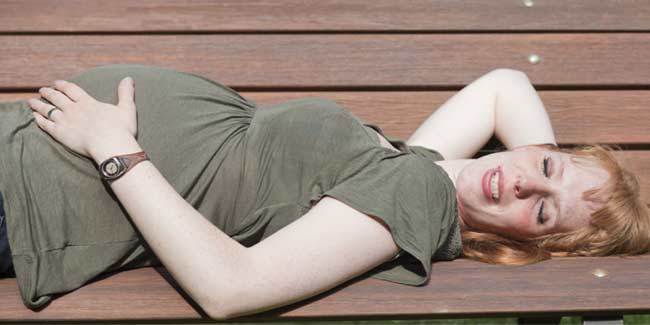
While nobody wants to talk about hemorrhoids during pregnancy, there are many women who experience it. Hemorrhoids are blood vessels in the rectal area which get swollen unusually. They typically vary from being size of a pea to that of a grape. All of it can be inside the rectum or stick out through the anus.
 Pregnancy makes women more likely to develop hemorrhoids, and also to varicose veins in the legs and at times in the vulva. There can be a variety of reasons for this. Your growing uterus exerts pressure on the pelvic veins as well as the inferior vena cava (the large vein that carries de-oxygenated blood from the lower half of the body into the right atrium of the heart). Your growing uterus can slow the flow of blood from the lower parts of your body. This would increase the pressure on veins below the uterus and cause them to become more swollen as well as dilated.
Pregnancy makes women more likely to develop hemorrhoids, and also to varicose veins in the legs and at times in the vulva. There can be a variety of reasons for this. Your growing uterus exerts pressure on the pelvic veins as well as the inferior vena cava (the large vein that carries de-oxygenated blood from the lower half of the body into the right atrium of the heart). Your growing uterus can slow the flow of blood from the lower parts of your body. This would increase the pressure on veins below the uterus and cause them to become more swollen as well as dilated.
Constipation, another problem commonly faced by women during pregnancy, can also result in or aggravate hemorrhoids. This is because strain in your abdomen has an impact on your uterus too and can lead to hemorrhoids. You also tend to strain when bowel movement is hard.
Some common symptoms of hemorrhoids during pregnancy are:
- Persistent pain.
- Occasional bleeding.
- Intensity of pain increasing during third trimester, particularly if it is the second pregnancy.
Hemorrhoids can have various indications such as blood drops after wiping or noticing a lump going through bowel movement. Uneasiness due to itching is the common feature of this disorder. Here are some types of hemorrhoids you need to watch out for:
- External hemorrhoids: These are found in the opening of anus and often do not need medical treatment unless a clot has developed. They can be irritating or itchy and cause bleeding at times. You may notice them as a lump or more than one lumps.
- Internal hemorrhoids: These are found inside the anal canal. They are generally not painful, but can cause itchiness and bleeding. They can also jut out, and when this happens they would be called prolapsed hemorrhoid. The degree of complication varies and it is measured on severity with classifications from first to fourth degree.
For most women, hemorrhoids will get better after delivery with the help of these self-treatment measures. In some cases, you may need to see a specialist for treatment to help shrink your hemorrhoids.
How we keep this article up to date:
We work with experts and keep a close eye on the latest in health and wellness. Whenever there is a new research or helpful information, we update our articles with accurate and useful advice.
Current Version